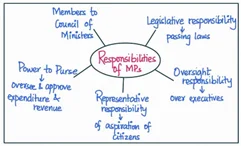UPSC CSE : 2013
Answer:
| Approach:
Introduction
Body
Conclusion
|
Introduction:
The Anti-Defection Law was introduced via the 52nd amendment to the Indian Constitution in 1985, which added the 10th Schedule to the Indian Constitution. The aim of this law was to curb political defections, which were causing instability in the government and undermining the faith of the electorate. The law prohibits elected members from defecting to another party after elections, and if they do, they are liable to be disqualified from their position.

Body:
However, the law also has certain unintended consequences:
While the Anti-Defection Law has served its purpose of bringing stability to the political structure and preventing unethical political defections, its unintended consequences on parliamentary debates and the role of individual MPs cannot be overlooked. There is a growing consensus that reform is needed in the functioning of the law to balance the need for political stability with the necessity for vibrant, constructive, and diverse debates in the Parliament.
For instance, the Dinesh Goswami Committee on electoral reforms suggested that disqualification should occur only in cases where there are clear defections, and not in cases where an MP/MLA simply votes against the party line. In the current form of the law, there’s a line of thought that it undermines the very spirit of democracy, which is based on debates, discussions, and a healthy difference of opinion.
As a specific case, there is a 2018 vote of no confidence in the Lok Sabha. The Telugu Desam Party (TDP) issued a whip to its members to vote against the government. However, one of the TDP’s MPs, Diwakar Reddy, defied the party’s order and abstained from voting. In this case, the anti-defection law served to stifle individual dissent and forced MPs to vote along party lines, suppressing what could have been a healthy debate on the floor of the house.
Conclusion:
The role of the Anti-Defection Law in diminishing the role of individual MPs and limiting constructive parliamentary debate is significant and necessitates careful review and reform.
<div class="new-fform">
</div>